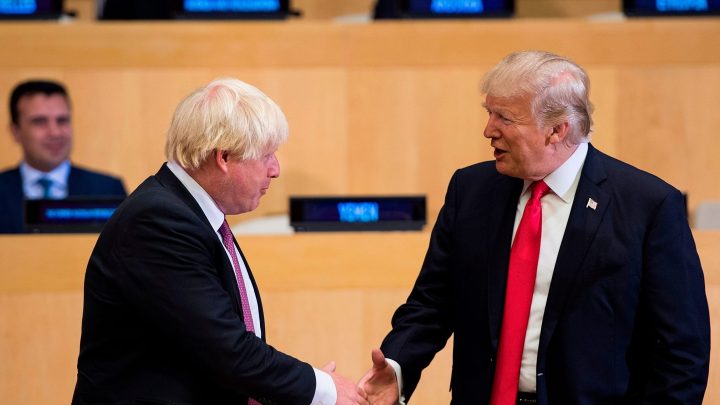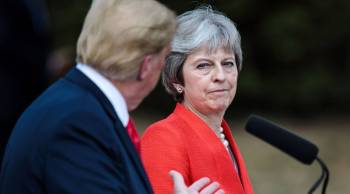
Post-Brexit trans-Atlantic trade deal faces obstacles

U.S. Vice President Mike Pence has reiterated the Trump administration’s readiness to deepen economic ties with the United Kingdom after Brexit. On a visit to Ireland this week, Pence said that the U.S. supports Britain’s decision to leave the European Union and would do everything to help the U.K.’s departure from the bloc.
“As President Trump announced last week, when Brexit is complete, the United States will have a new trade agreement with the United Kingdom,” Pence said.
His words will have been a balm for Britain’s embattled prime minister, Boris Johnson. A trade deal with the world’s richest economy would go some way toward making up for any loss of business with the EU and would be a symbolically important sign that the U.K. was not isolated and friendless.
But a U.S.-U.K. trade deal faces at least two major stumbling blocks: one in agriculture and the other in health care. There is widespread concern that Britain’s animal welfare standards and its universal public health system might be adversely affected by unfettered competition with American companies and suppliers.
At the Edenbridge and Oxted Agricultural Show, one of Britain’s oldest and most prestigious farm shows, Marketplace met farmers and consumers who are worried about lowering all trade barriers with the U.S.

“Our animal welfare standards are very high,” said Graham Powell, who was exhibiting some prize dairy cattle at the show. “If America wants to adopt higher welfare standards and adopt a level playing field, then that’s great. Let’s go for it. That’s competition. And that’s fair.” Powell said.
Under EU regulations, Britain has banned imports from the U.S. of hormone-treated beef and poultry rinsed in chlorine, saying they involve animals being kept in cramped, unhealthy and unhygienic conditions. Food safety, it is suggested, might even be at risk. Alan Bishop, another cattle farmer at the show, is also nervous about completely free trade with the U.S.

(Mimisse Beard )
“I don’t think we should import anything that doesn’t meet our standards,” Bishop said. “If hormone-treated beef flooded into Britain, it would be a lot cheaper. And it would be very hard for our market to compete with it. Our welfare standards might be dragged down.”
The U.S. administration and the agricultural industry dismiss this as protectionism, pointing out that there is no evidence of a health risk from American produce and insisting the U.S. takes animal welfare as seriously as the Brits. But perception is everything when it comes to selling a trade deal to the public, and judging by consumers at the Edenbridge show, there’s not much of a public appetite for letting in that American fare.
“ I don’t think it should be allowed in, no,” said Carole Bishop.
“ No, I think it’s very wrong,” was Marianne Evans’ verdict.
“I wouldn’t want to eat it or buy it,” Richard Clarke observed. “But I don’t have a problem with it coming in. If people want to eat it, they can eat it.”
But Lee Hendricks was adamant.
“I don’t believe in chlorine-washed chicken and that beef. I think it should definitely be kept out of the country altogether,” he said.
Animal welfare and food safety are not the biggest obstacles to a comprehensive free trade deal between the U.S. and the U.K. That would be the National Health Service, or NHS, Britain’s most highly prized and staunchly defended public service. In London, some 25 miles north of the Edenbridge show, Dr. Tony Sullivan, a retired NHS doctor, told Marketplace of his concerns about a U.S.-U.K. deal. Sullivan runs a campaign group that aims to prevent any further expansion of private-sector provision within the NHS. Its members fear that would erode the system’s public service ethos.

“We want to defend the public service ethos of our NHS.”
“We are so worried about this trade deal that we set up a petition to say: ‘Donald Trump, hands off the NHS,’” he said.
The petition, which has so far attracted three-quarters of a million signatures, calls for health care to be excluded from any free trade agreement. The purpose is to stop American medical companies from playing a bigger role in Britain’s public health care system than they do at present; currently they provide some outsourced services in mental health, logistics and information technology. Sullivan and his fellow campaigners don’t want a bigger American involvement in the U.K.’s taxpayer-funded, free-at-the-point-of-use health system.
“In America, as I understand it, health care is delivered dependent on the ability to pay. That is what we don’t want,” Sullivan insisted.
Many patients in Britain wouldn’t want that either. They perceive the American system as heartless and over commercialized, while they see the NHS, with all its faults, as an expression of British values of compassion and solidarity.
NHS patient Chris Pinnard told Marketplace: “I’ve always felt that the NHS is one of the greatest things about the U.K., that if you are unwell or you injure yourself, you will be picked up and you will be looked after. There’s none of this sitting by the side of the road getting your credit card cleared while you wait to get in the back of the ambulance,” he said.
“We still have a bedrock of believing that everybody has an equal right to good health. I do believe that would be at risk if there were a comprehensive free trade agreement between the U.S. and the U.K.,” said Sue Richards.
“The free trade agreement is designed to make profit-making more efficient. That should not happen in the National Health Service,” David Margolies said.
The British government has pledged that health care, food safety and animal welfare and will not be affected by any trade deal with the U.S. But, say the cynics, that may depend on how desperate the U.K. is for a deal after Brexit.
There’s a lot happening in the world. Through it all, Marketplace is here for you.
You rely on Marketplace to break down the world’s events and tell you how it affects you in a fact-based, approachable way. We rely on your financial support to keep making that possible.
Your donation today powers the independent journalism that you rely on. For just $5/month, you can help sustain Marketplace so we can keep reporting on the things that matter to you.


















